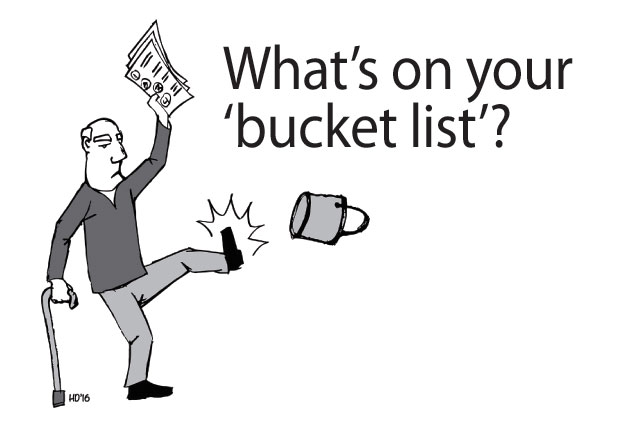
Climb to the top of the highest point on earth and descend safely to sea level with all 21 digits intact.
- Joe Patterson at www.bucketlist.org <Climb Everest
Count on it, there are travelers hanging around Thamel with ‘Nepal’ on their bucket lists, and maybe even ‘Climb Everest’ (and return with all digits intact).
Lara Parker of BuzzFeed gives us ‘12 reasons Nepal should go on your vacation bucket list’. Her list (with great photos) includes The Annapurna Region, Bird Watching, World Heritage Sites, Diverse Cultures, and Nepalese Food. Her food photo, however, misses the point – two trekkers having an ordinary international breakfast of tea, omelet, toast and cereal al fresco (Italian for eating out in the cool). It could be anywhere in the world if not for the Nepalese villages in the background. Where’s the dal-bhat or the mo-mos?
‘Bucket list’ is a relatively new term, first added to Merriam-Webster’s Collegiate Dictionary in 2012. Atlantic magazine then published an article entitled ‘Meet the dictionary’s new words: f-bomb, sexting, bucket list’. Oxford Dictionary added the new word the next year.
When I wanted to find out more about its origins, my go-to source for such erudition was Grammarphobia.com. But the editors, Patricia O’Conner and Stewart Kellerman, failed me in their blog post, ‘An aha moment in lexicography’, by pointing out that bucket list is an idiom “that need(s) no introduction.” Done.
So I delved deeper into dictionaries of English slang and found this definition “a list of things a person wants to do before they ‘kick the bucket’ (i.e., die).”
Why the bucket?
In the Middle Ages, it is said, when someone was condemned to die by hanging the poor chump was noosed up while standing on a bucket. Then the bucket was kicked away and…, well, you get the idea, left dangling ’til dead. Great story, but when experts disputed that account, the Oxford Dictionary determined that it is really an early 21st century word, popularized by the 2006 film ‘The Bucket List’, in which two old codgers (played by Jack Nicholson and Morgan Freeman) escape from a cancer ward determined to pursue a list of things to do before they kick off.
My personal writer’s bucket list includes “Identify Words Not to Like.” That was easy when I found a list already started in an Atlantic magazine article entitled ‘Dictionary of Despicable Words’. It includes such contemptible terms as: • arguably – immediately put down as “a non-word”; • awesome – “The worst word on the planet… even more dreadful when preceded by the word like, as in ‘I saw that movie last night. It was, like, AWESOME!’ ”; • epic –an “epic mistake, man”); • firstly – “Why the -ly? Simplify,” they say; and • interesting – “Because it means nothing.” And so on, to be avoided – although writers (like me) sometimes have a problem shaking off bad habits.
So now, where did all this interesting writerly wisdom come from? My key sources were the dictionary lexicographers and grammarphobic etymologists, and the two stories archived online at theatlantic.com. Making ‘the Bucket List’ movie is described in the Wall Street Journal, online at wsj.com/articles/the-origins-of-bucket-list-1432909572. And for more about the fad see newyorker.com/culture/cultural-comment/kicking-the-bucket-list.
Lara Parker’s article is online at buzzfeed.com/laraparker/parts-of-nepal-that-prove-it-should-be-your-next-vacation. And check out the epic website, bucketlist.org, where climbing Everest and returning “with all 21 digits intact” is posted. (Twenty-one! Count ’em, man.) For more inspiration see bucketlistjourney.net. Lastly (there’s that contemptible “-ly” again), travel agencies have also capitalized on the craze, such as bucketlistadventuretravel.co.uk and sherpatours.com.au/bucket-list.
Going back to “writerly,” the fancy term that I used above as an authorial adjective, it made the new word list back in 1957. Webster’s defines it “typical of a writer.” The Oxford calls it “consciously literary.”
Okay! Now you know! (And that “-ly” in writerly is arguably okay.)
That’s some of my bucket list of words to mull over, including those reoccurring despicables.
What’s on your list?
Don Messerschmidt, columnist and contributing editor to ECS Nepal magazine, can be contacted at don.editor@gmail.com.
The illustrator, Hans Messerschmidt, can be contacted at www.modcreatives.com (email: hans@themodcorp.com).









